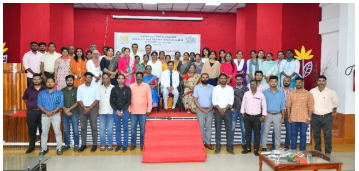A five-day Peripatetic Training Programme focusing on office procedure, noting, drafting, record management, and the Right to Information (RTI) began on September 15 at the auditorium of the Tagore Government College of Education (TGCE) in Sri Vijaya Puram. The training is designed for staff of the Amalgamated Clerical Cadre of the Andaman and Nicobar Administration and includes participants from the Andaman and Nicobar Command (ANC).
The programme has been organized by the Administrative Reforms and Training Wing of the administration in collaboration with the Institute of Secretariat Training and Management (ISTM), a premier body under the Department of Personnel and Training, Government of India. The training reflects an ongoing emphasis on continuous capacity building among government staff to ensure more efficient and transparent governance.
The inaugural session was presided over by Assistant Secretary (Administrative Reforms and Training/Public Grievance Cell) Shailaja, who underlined the importance of strengthening institutional knowledge and upgrading skills in administration. She pointed out that clerical staff form the backbone of government operations, and initiatives like this are essential to enhance efficiency and service delivery.
ISTM has deputed Deputy Director Jitender Bhatti to lead the sessions, bringing specialized expertise to the programme. His involvement is expected to enrich the sessions with practical insights drawn from years of training government staff across India. The training is scheduled to run until September 19, concluding with assessments and feedback to gauge its impact.
The peripatetic training model allows trainers to reach different regions and institutions, ensuring wider coverage and inclusivity. By conducting programmes locally, employees from smaller island stations and government offices can access high-quality training without the need for travel to mainland centers. This approach is particularly significant for island territories, where logistical challenges often limit exposure to professional development opportunities.
During the sessions, participants will be introduced to systematic approaches for drafting official notes, maintaining records, and managing files efficiently. Special focus is being given to RTI compliance, reflecting the administration’s commitment to transparency and accountability. Proper record-keeping and timely responses under RTI remain key challenges in public offices, and the training aims to address gaps through practical exercises and case studies.
The programme also emphasizes the importance of adopting modern administrative tools, such as digitized file management, without losing sight of traditional documentation methods still in practice. Trainers are expected to highlight how effective communication and accurate documentation directly influence the quality of governance.
For many participants, the event marks a rare opportunity to interact with national-level trainers and discuss practical challenges faced in day-to-day administration. Peer learning and sharing of best practices are also expected to enrich the sessions, ensuring that learnings are not limited to theory but rooted in real experiences.
The training wing of the Andaman and Nicobar Administration has been consistently working to improve human resource capacity through workshops, seminars, and refresher courses. Programmes like this are part of a larger strategy to create a skilled workforce capable of supporting the Union Territory’s governance goals.
As the five-day programme progresses, it is expected to leave participants with a sharper understanding of their roles and responsibilities. The initiative underscores the administration’s belief that strong institutions are built not just on policy but also on well-trained staff who execute policy effectively.






